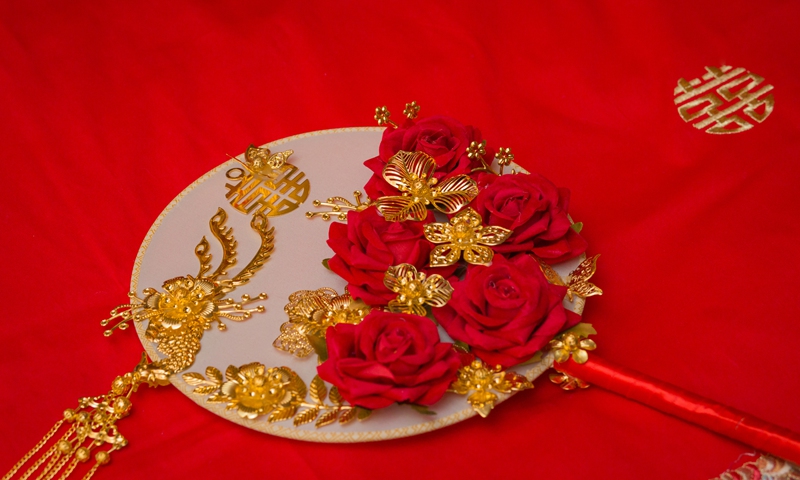New couples in E China's county with low bride prices to be rewarded with a pre-option for children's school enrollment

Photo: VCG
A county in East China's Jiangxi Province, previously criticized for its exorbitant bride prices, is intensifying efforts to shed outdated customs. The latest initiative offers incentives such as pre-option for children's enrollment, health check-up services, and shopping discounts for new couples who adhere to the "low or zero betrothal prices" proposal.
Chongyi county in Jiangxi recently introduced a courtesy services and measures to promote wedding customs reform, according to a news report by China Youth Daily on Sunday.
The county encourages bridegrooms-to-be to give brides-to-be money and gifts no more than 39,000 yuan ($5,418.08) when they get engaged.
The "bride price" is a traditional Chinese prerequisite for marriage. Giving a "bride price" as a betrothal gift has a long history in China as a goodwill gesture between the couple and their two families. However, the "bride price" has risen from a token amount to very high levels, particularly in poorer areas, and the nature of the traditional custom has changed a lot over the years.
In order to implement and popularize the trend of "low or zero bride prices," Chongyi county promised that those new couples with "reasonable betrothal gifts" can have their children enjoy the priority to choose schools within the county in the future.
Additionally, the couples are entitled to free visits to national tourist attractions within the county and a complimentary health check-up at public hospitals. They can also ride the public bus for free within the county urban area for one year.
Under equal conditions, individuals of those eligible couples are given priority for employment as civilized practice volunteers and other public welfare positions, enjoy an 8.8 percent discount on wedding banquets, priority access to subsidies for integrated irrigation policies for orchards, and discounts on bedding, wedding dresses, and wedding photography.
The incentive policies also include support for entrepreneurship, banquet discounts, shopping discounts, agricultural benefits, and 10 other aspects.
Those eligible couples can be rewarded with a certificate of honor for following the "low or zero bride prices" proposal and the certificate presenters can be local senior officials, policymakers, political advisors or moral models.
In addition, their parents-in-law will receive an "excellent mother-in-law" or "excellent parents-in-law" certificate of honor. Their parents-in-law also enjoy those incentives.
Last February, China unveiled its key policy document or No. 1 central document, vowing to launch a special campaign against problems including exorbitant "bride prices" and extravagant wedding ceremonies as part of nationwide efforts to strengthen the construction of public cultural-ethical standards in the country's rural areas.
The document encouraged local governments to formulate norms for changing outdated customs in light of local conditions, strengthen the role of village rules and conventions in countering bad behavior, and that Party members and officials should take the lead in setting examples.
In recent years, many other cities and counties in Jiangxi are stepping up campaigns to address the problems of excessive "bride prices" and extravagant wedding ceremonies especially in rural areas.
At the same time, more and more young couples who have been well educated actively followed the new trend of "low or zero betrothal prices," the Global Times learnt.
The Global Times learnt from an official in Jiangxi's Quannan county that they have released similar incentive policies as Chongyi. The local marriage process has been reduced from the original 13 items to five, the average cost of marriage has been reduced by 28,000 yuan, and the "low or zero bride price" accounted for 73 percent of marriages in the county, data in November 2023 shows.
An official from Shangrao, a city in Jiangxi, who requested anonymity, told the Global Times on Monday that exorbitant bride prices were never a local folk custom or historical tradition in Jiangxi.
A few years ago, with the improvement of people's economic income and living standards, people started to ask for higher bride prices, the official said, adding that binding the lifelong happiness of young men and women to material conditions went against traditional virtues.
The official said that it is unrealistic and unnecessary to completely stop or forcibly curb the bride price tradition, but excessive and unaffordable bride prices should be restricted.

